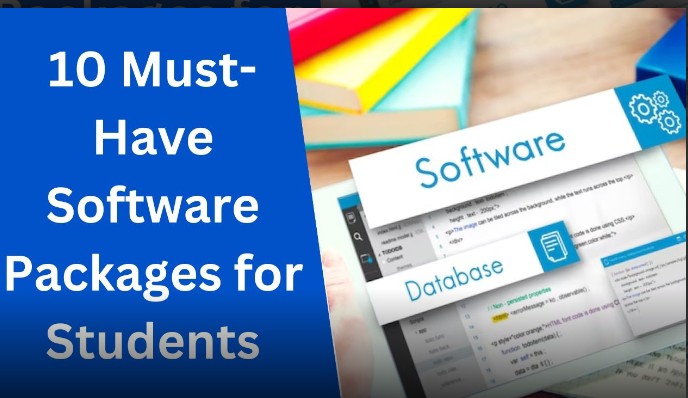
Software packages serve different purposes ranging from Office and productivity, Communication, notetaking and creative collaboration, graphic designs, database management systems, media editing, reference management and many more. Amongst these packages, students needs to maximize the usage in attending virtual classes, taking notes, group brainstorming or collaboration, data analysis using spreadsheet and keeping files for professionalism and career advancement.
In terms of personal development, it is crucial for students to acquire proficiency in using software packages as they play a vital role in their academic endeavors. Acquiring skills in these packages not only enhances productivity in effective documentation but also facilitates smooth collaboration across diverse platforms and organizations.
Here are some of the Software Packages for Students:
1. Google drive
One of the leading web-based software solution, offering free storage and useful apps for students, stands out in the digital aspect. This suite includes a word processor, presentation tools, and a spreadsheet solution, making it an extensive free software package tailored for college students. Its features are useful in document creation and presentation development, sticking it as one of the top choices for students. Additionally, the collaborative capabilities of its spreadsheet make it particularly valuable for group projects and teamwork.
2. Microsoft Office online
This cloud service grants access to multiple users to collaborate simultaneously on a single document. However, it is worth noting that Office Online comes with certain limitations, particularly in terms of plugins and add-ons. This package offers Microsoft’s suite of productivity applications, such as Word, Excel, PowerPoint, Outlook, and OneNote. With Office Online, you can utilize these apps on any device, as long as you are connected to the internet.
3. Libre office
A widely used substitute for Microsoft Word, this application stands out as one of the most creditable free options for students, owing to its free usage nature. Providing similar functionalities and a user-friendly interface reminiscent of Microsoft, some may label it as a replica, but it seamlessly handles Microsoft files. Consequently, it proves to be a valuable and cost-free alternative to Microsoft Office.
4. WPS Office
One of the advantages of WPS Office lies in its seamless compatibility with Microsoft Office. This means you can edit Microsoft Office files using WPS, and vice versa. Noteworthy features encompass integrated charts, animations, sophisticated modeling, effortless presentations, built-in formulas and functions, and the option for add-ons.
5. Zoom
Zoom has made webinars and classes more accessible, especially during the COVID-19 pandemic. The rise in its usage has been attributed to the quarantine periods making the package stands out as the renowned platform. communication technology platform. The free version of Zoom has become increasingly popular for classroom discussions and group collaborations. This complimentary service allows simultaneous connections from up to 100 devices. However, there is restriction to the duration and number of participants in a session.
6. Skype
Skype, a well-known video and chat software, ideal for academic collaboration which allows seamless communication. Users can make free calls and host conferences for up to 100 participants on any device. Additional features include meeting recording, instant messaging, multiple platforms and screen sharing for both desktop and mobile use.
7. Facebook Messenger
Facebook Messenger, a communication platform from Facebook, is now available as standalone mobile and desktop apps, unlike its initial version limited to the main website or application. This allows users, including students, to access their accounts without distractions from their timelines, promoting focused communication.
8. Evernote
Evernote is a popular cross-platform application for note-taking and collaboration, available on Windows, macOS, iOS, and Android. Its user-friendly interface and collaboration tools, particularly Spaces, facilitate easy sharing and teamwork for classes and research projects. Spaces includes a virtual bulletin board and a native search engine for efficient collaboration.
9. Notion
Notion allows easy online publishing and study group sites with a simple drag-and-drop interface. Its versatile features include embedding code, equations, images, and more. The Personal plan offers unlimited pages and blocks, supports sharing with up to five guests, and syncs content across devices via the web or mobile apps.
10. One note
Microsoft’s OneNote is a feature-rich note-taking application accessible across various devices. It provides multiple levels for detailed note organization, allowing users to add and format text, embed screenshots, videos, links, and more. Additionally, users can customize the background of OneNote to resemble a ruled notebook.